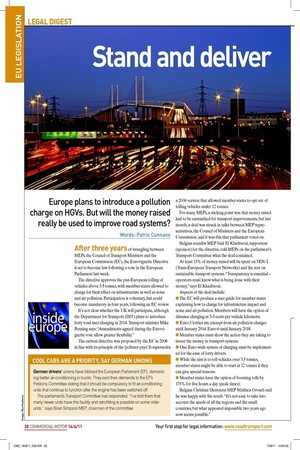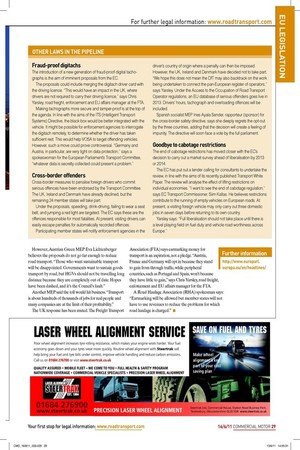Stand and deliver
Page 24

Page 25

If you've noticed an error in this article please click here to report it so we can fix it.
Europe plans to introduce a pollution charge on HGVs. But will the money raised really be used to improve road systems?
Words: Patric Cunnane After three years of wrangling between MEPs, the Council of Transport Ministers and the European Commission (EC), the Eurovignette Directive is set to become law following a vote in the European Parliament last week.
The directive approves the pan-European tolling of vehicles above 3.5 tonnes, with member states allowed to charge for their effect on infrastructure as well as noise and air pollution. Participation is voluntary, but could become mandatory in four years, following an EC review.
It’s not clear whether the UK will participate, although the Department for Transport (DfT) plans to introduce lorry road user charging in 2014. Transport minister Mike Penning says: “Amendments agreed during the Eurovignette vote allow greater lexibility.” The current directive was proposed by the EC in 2008 in line with its principle of the ‘polluter pays’. It supersedes a 2006 version that allowed member states to opt out of tolling vehicles under 12 tonnes.
For many MEPs, a sticking point was that money raised had to be earmarked for transport improvements, but last month, a deal was struck in talks between MEP representatives, the Council of Ministers and the European Commission, and it was this that parliament voted on.
Belgian socialist MEP Said El Khadraoui, rapporteur (sponsor) for the directive, told MEPs on the parliament’s Transport Committee what the deal contained.
At least 15% of money raised will be spent on TEN-T (Trans-European Transport Networks) and the rest on sustainable transport systems. “Transparency is essential – operators must know what is being done with their money,” says El Khadraoui.
Aspects of the deal include: ● The EC will produce a user guide for member states explaining how to charge for infrastructure impact and noise and air pollution. Members will have the option of distance charging at 3-5 cents per vehicle kilometre.
● Euro-5 lorries are exempt from air pollution charges until January 2014. Euro-6 until January 2018.
● Member states must show the action they are taking to invest the money in transport systems.
● One Euro-wide system of charging must be implemented for the ease of lorry drivers.
● While the aim is to toll vehicles over 3.5 tonnes, member states might be able to start at 12 tonnes if they can give special reasons.
● Member states have the option of boosting tolls by 175% for ive hours a day (peak times).
Belgian Christian Democrat MEP Mathieu Grosch said he was happy with the result. “It’s not easy to take into account the needs of all the regions and the small countries, but what appeared impossible two years ago now seems possible.” However, Austrian Green MEP Eva Lichtenberger believes the proposals do not go far enough to reduce road transport. “Those who want sustainable transport will be disappointed. Governments want to sustain goods transport by road, but HGVs should not be travelling long distance because they are completely out of date. Hopes have been dashed, and it’s the Council’s fault.” Another MEP said the toll would hit business. “Transport is about hundreds of thousands of jobs for real people and many companies are at the limit of their proitability.” The UK response has been muted. The Freight Transport Association (FTA) says earmarking money for transport is an aspiration, not a pledge. “Austria, France and Germany will opt in because they stand to gain from through trafic, while peripheral countries, such as Portugal and Spain, won’t because they have little to gain,” says Chris Yarsley, road freight, enforcement and EU affairs manager for the FTA.
A Road Haulage Association (RHA) spokesman says: “Earmarking will be allowed but member states will not have to use revenues to reduce the problems for which road haulage is charged.” ■














































